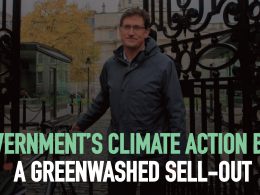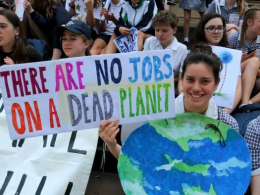Climate Change is already destroying lives. 21,000 people died as a direct result of extreme weather conditions in the first nine months of this year, a new Oxfam report says.
Millions suffered great hardship. It is likely to get worse – 2010 could be one of the hottest years in recorded human history. As governments meet in Cancun, Mexico to discuss climate change, socialistparty.net asks: does the green movement have any alternative to the environmental catastrophe that capitalism offers?
Last year’s UN conference on climate change in Copenhagen summit was intended to tackle global warming. But in a watershed for the environmental movement, the meeting ended in total disarray and collapse. It effectively finished, for the foreseeable future, serious attempts by the capitalist class worldwide to address the impending disaster caused by human-induced climate change.
Before the conference the UN, who sponsored it, called it the ’last chance’ to avoid catastrophic global warming. Then, after its failure, a chief mouthpiece of capitalism, the Financial Times, called the outcome a “fiasco” and “worse than useless”. Socialists were always sceptical about the outcome of a meeting of governments who represent the interests of big business including big oil.
Protesters in Copenhagen saw these problems. Many of the 100,000 demonstrators on Copenhagen’s streets (including a large contingent from our socialist international, CWI) recognised that global warming cannot be overcome within the framework of capitalism. ’Our planet, not your profits’, ’System change, not climate change’, were prominent slogans. So what was the reaction of the environmental groups and political parties? At first there was almost stunned silence.
Eventually, nearly all environmental groups denounced Copenhagen as a betrayal and poured bitter invective on the participants. Most however failed to recognise the significance of what had happened. For example, in April 2010 Greenpeace demanded that higher targets be adopted at that month’s EU Copenhagen follow-up meeting in Bonn.
Friends of the Earth (FOE) also called for a new target, of a 40% reduction in emissions by 2020 compared to the EU ’offer’ of 20% at Copenhagen That offer, by the way, was really only 10% when ’offsetting’ scams built into Copenhagen were taken into account, such as the sponsoring of dubious ’green’ projects in poor countries to get reductions in emissions quotas.
Certainly the 20% target was inadequate, but this missed the point. If the world powers never came close to agreeing even Copenhagen’s low and inadequate targets, what chance was there of them suddenly agreeing to double the targets a few months later? What had changed? Greenpeace and FOE never addressed these questions. Nothing significant came out of the Bonn meeting.
The Green Party in Britain looked as if it was drawing some lessons from the Copenhagen debacle when it belatedly backed the World People’s Conference on Climate Change and the Rights of Mother Earth in Cochambamba, Bolivia in April 2010. This conference, modelled on the World Social Forums, focused on the needs of poor nations and the dangers that climate change posed to them.
Rising sea levels
The conference correctly said that industrialised countries need to cut greenhouse gas emissions by 50% by 2020 to prevent places like the Maldive Islands disappearing entirely due to rising sea levels.
Unfortunately, instead of proposing to build a new movement to tackle global warming, based on grassroots campaigning organisations, landless movements, labour and socialist bodies, which could then have asked for support from radical governments in Venezuela, Bolivia and Ecuador, the conference decided to submit its demands to the failed UN-sponsored climate change structures that presided over the Copenhagen disaster.
The UN is part of the problem not the solution. It represents its constituent members with their conflicting capitalist interests, and is dominated by the major imperialist powers and China. All these governments put the short-term interests of the big corporations based in their territory first and tend to veto, as they did in Copenhagen, any proposals that threaten their profits.
Some direct action organisations such as Plane Stupid, Climate Emergency and Climate Camp took a more radical position. Many of their activists see that competitive capitalist markets inevitably degrade the environment and look for an alternative to the market system.
Some draw the conclusion that it is pointless appealing to politicians and put their faith in direct action, not to pressurise governments, but to tackle the problem directly by closing power stations or airports.
This approach may help to increase awareness of specific issues but it ignores the reality of the capitalist system. For example, if such a movement ever threatened power supplies, the full force of the state would be unleashed against it. Without mass support and a political programme to address how to beat the power of the state, the movement would be crushed.
To avoid this, a programme would need to recognise that environmental activists need to link up with the labour movement and adopt a socialist perspective and tactics. This would involve introducing a phased programme of replacement of existing energy supplies with renewables – entirely possible with a democratically planned approach -rather than seeking to just shut down existing power stations.
One environmental group puts a more left position and addresses how to tackle the capitalist system, the Campaign Against Climate Change (CCC), in particular its trade union group. CCC’s programme for green job creation is very welcome but more problematical is its analysis of how it is to be paid for and implemented. To pay for a switch to renewable energy and other measures necessary to cut CO2 emissions, CCC puts forward a combination of borrowing, printing money and taxing the rich – a form of green Keynesianism.
CCC says that it is not unprecedented in Britain for similar measures, and on an even bigger scale, to be put into practice. They correctly give the example of World War Two where capitalist governments massively expanded spending and introduced extensive public control and planning.
However, the Keynesian measures called for are very unlikely to be implemented under the present ’free market’ system. Unlike in World War Two where all capitalist governments involved were fighting for their lives, none today see climate change as similarly important, so the war analogy is of limited relevance.
The cost of tackling global warming is relatively small, and most governments now accept the seriousness of the situation. But they all refuse to take any serious action because they don’t want to hit, even in a small way, the profits of ’their’ multinational companies.
Even in a hypothetical situation which saw them implemented, Keynesian methods such as printing and borrowing money and taxing the rich (the latter to be welcomed of course) would provide no easy answers.
’Green Keynesianism’ aims to pressurise governments to spend sufficient money on global warming as the CCC proposes.
Some headlines suggest this is going with the grain. The renewable sector is expanding currently by 25-30% a year internationally and some leading wind energy companies recently announced new investment in the UK. GE, Siemens and Gamesa say they will invest £300 million in the next three to four years.
Also, the recent comprehensive spending review was met with relief by some environmentalists because it did not axe all green spending.
System change
Closer examination shows that the claims of headline writers and governments to be tackling global warming do not stand up. The number of new wind energy projects in Europe getting financed has dropped sharply since the end of 2009 according to the Financial Times and stock market prices of renewable energy companies have fallen.
The fall in share prices reflects big business’ expectation that austerity measures will lead to cuts in state subsidies, on which the sector depends. For example, start-up funding for green energy companies fell by a fifth in the third quarter of 2010, a fall blamed on the lack of government support according to the Financial Times on 25 November.
Despite some green window dressing, inserted to save the face of Lib Dem Energy and Climate Change minister, Chris Huhne, the comprehensive spending review said austerity measures will include hitting projects to tackle climate change. And the few crumbs that were made available will be totally inadequate to address the scale and urgency of the problem.
In fact, the money available from both government and private companies to tackle global warming is tiny compared to the need established by the recent Labour government sponsored Stern report.
The Copenhagen climate change summit’s collapse proved the impotence of the world powers and the market system they represent to take serious measures to reverse global warming.
However, the forces for change are on the move. Internationally, workers, young people, poor farmers, the dispossessed, and sections of the middle class are being forced into struggle against intolerable conditions imposed by a pathologically decaying capitalist system.
Increasingly, system change – the idea of an alternative, democratically planned, socialist form of society – is gaining support as the guiding aim of struggle. The alternative is the nightmare of climate disaster and social catastrophe.













